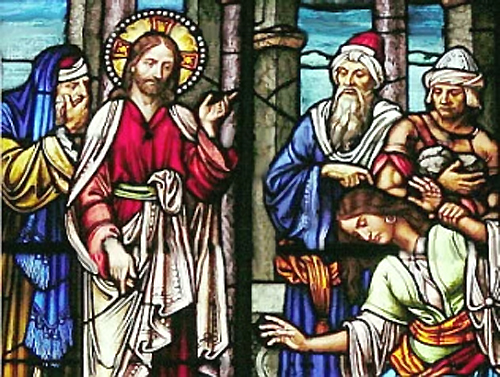Christian Art | Christian Marriage | Love Revealed By Jesus Christ
Matthew 19: 3-12 – Week 19 Ordinary Time, Friday (King James Audio Bible KJV, Spoken Word)
3 ¶ The Pharisees also came unto him, tempting him, and saying unto him, Is it lawful for a man to put away his wife for every cause?
4 And he answered and said unto them, Have ye not read, that he which made them at the beginning made them male and female,
5 And said, For this cause shall a man leave father and mother, and shall cleave to his wife: and they twain shall be one flesh?
6 Wherefore they are no more twain, but one flesh. What therefore God hath joined together, let not man put asunder.
7 They say unto him, Why did Moses then command to give a writing of divorcement, and to put her away?
8 He saith unto them, Moses because of the hardness of your hearts suffered you to put away your wives: but from the beginning it was not so.
9 And I say unto you, Whosoever shall put away his wife, except it be for fornication, and shall marry another, committeth adultery: and whoso marrieth her which is put away doth commit adultery.
10 ¶ His disciples say unto him, If the case of the man be so with his wife, it is not good to marry.
11 But he said unto them, All men cannot receive this saying, save they to whom it is given.
12 For there are some eunuchs, which were so born from their mother’s womb: and there are some eunuchs, which were made eunuchs of men: and there be eunuchs, which have made themselves eunuchs for the kingdom of heaven’s sake. He that is able to receive it, let him receive it.
Jesus tells us that, from the beginning, a man and a woman joined in marriage would become one flesh. There is this complementarity of man and woman in sexual union. Divorce marks a falling away from God’s intentions for men and women in marriage. It is an aberration, a failure of docility before God. Jesus tells us that Moses’ command (see Deuteronomy 24:1) was because of the hardness of people’s hearts in rejecting God’s initial ordering of male and female sexual relations. Indeed, it can be seen as a liberal command, protective of women, in that it required the husband to write out a certificate of divorce, freeing the woman rather than merely excluding and rejecting her. There is no real trap here for Jesus, as the Pharisees tempt him; God’s creation of man and woman to become one flesh in marriage remains truth.
As we read these Bible verses now, we may inevitably think of the celibacy of priests, of the issue of divorce in our time, and perhaps also of the various issues surrounding gay, or homosexual, relationships, in particular the issue of gay marriage. Perhaps we may also consider those more primitive societies in which violations of laws concerning sexual activity can lead to imprisonment and/or execution.
Jesus’ teaching is outside of his time, both reaching back to God’s original intentions and looking forward to that which will become acknowledged truth for Christians. Jesus’ very disciples think this is a hard teaching: If this is how it is to be between a man and his wife, they say, then it is not good to marry!
Jesus now speaks of different ways of living well as a man or a woman in relation to sexuality. It is good for a man or a woman to marry and to have children. It is an even more perfect sign of the life to come, for those few who can, to preserve one’s virginity and to live in a state of celibacy, consecrated to the Lord. Both marriage and celibacy can be considered two pillars of faith.
There is also understanding in these verses of those who have married and who have been divorced. Perhaps their marriage may be annulled. Perhaps it may be that, following on from the divorce, there will be no annulment, and so now the husband and wife are called to live a life of celibacy, for the Kingdom’s sake, true to their vows. This would be the way of perfection, while there should be understanding for those for whom this seems too much.
Many issues are touched upon in these verses regarding sexuality. We are called to keep our sexual selves sacred to God, and certainly never to put our sexual proclivities over and above our calling to be God’s people – which would be to set up a rival good to God’s. We are called to treasure our sexual being in the light of God’s love.
Concluding Prayer
Lord Jesus Christ,
who on the cross called the penitent thief into your kingdom,
in faith and trust and confessing our sins
we implore your mercy
that after our death
you will lead us rejoicing through the gates of paradise.
Who live and reign for ever and ever.

![]()
King James Audio Bible | Endnotes | Love Revealed By Jesus Christ
Two Shall Be One Flesh
The Gospel passage affirms the significance of marriage as a union of two people, a union that is ordained by God. Jesus quotes the words from the book of Genesis, which speaks about the creation of Adam and Eve and how they became one flesh. This unity is not only physical but also emotional and spiritual, where two people become one in all aspects of their lives.
The concept of marriage being a union between two people is further elaborated in the Epistle Of Saint Paul To The Ephesians. Saint Paul wrote: ‘For this cause shall a man leave his father and mother, and shall be joined unto his wife, and they two shall be one flesh. This is a great mystery: but I speak concerning Christ and the church.’ (Ephesians 5:31-32) Here, the union between a man and a woman is compared to the relationship between Christ and the Church, where both are united in a spiritual and emotional bond.
Throughout history, Christians have emphasized the sacredness of marriage as a covenant between two people. Saint Augustine of Hippo wrote about the importance of the unity between a man and a woman in his book The Good Of Marriage. Saint Augustine argued that marriage is a sacrament that is ordained by God, and that it is a means of sanctification for both partners.
In the Protestant tradition, Martin Luther, founder of the Lutheran Church, spoke about the importance of marriage in his treatise The Estate Of Marriage. Martin Luther argued that marriage is a divine institution and that it is necessary for the procreation and upbringing of children.
More recently, Pope Francis has spoken about the importance of marriage as a bond between two people. In his apostolic exhortation Amoris Laetitia, Pope Francis emphasizes the significance of the ‘one flesh’ union between a man and a woman, which is ‘not a mechanical or external reality, but rather a spiritual and profound one’ (Amoris Laetitia, 294).






